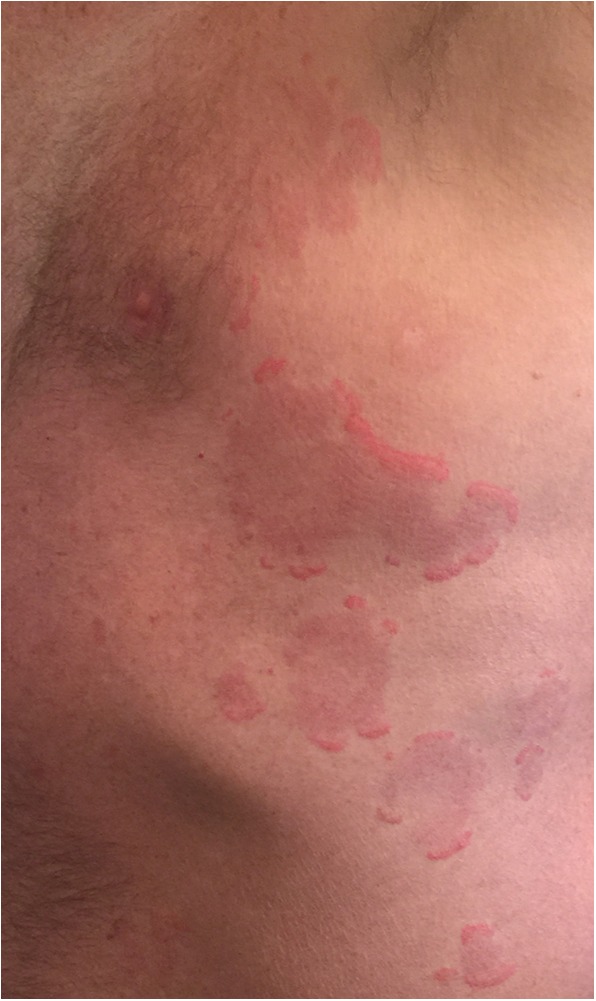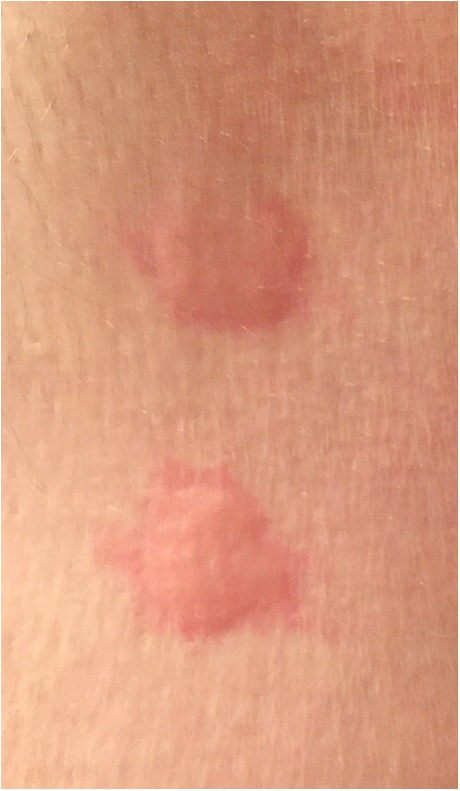Abstract
The alpha-gal allergy is an emerging IgE-mediated reaction against the galactose-alpha-1,3-galactose carbohydrate found in mammalian meats. Patients with this condition will develop anaphylactic symptoms 3–6 h after the ingestion of mammalian meat food products such as beef, pork or lamb. The prevalence of this allergy is drastically increasing and severe reactions including anaphylactic shock have been reported, yet many patients experience symptoms for years before a diagnosis is made. We describe the presentation, diagnosis and management of a patient with the alpha-gal allergy in attempt to improve early recognition and management of patients with this condition.
INTRODUCTION
The alpha-gal allergy is a recently recognized IgE-mediated reaction against the galactose-alpha-1,3-galactose carbohydrate found in non-primate mammalian meats [1]. Unlike other food allergies, this condition elicits a delayed onset of anaphylactic symptoms 3–6 h after the ingestion of mammalian meat food products such as beef, pork or lamb. Studies suggest that being bitten by the lone star tick (Amblyomma americanum) is the only significant cause of these responses in the United States [1]. These ticks are common in the southeastern region of the country. Although the prevalence of the alpha-gal allergy is drastically increasing and severe reactions leading to anaphylactic shock can occur [2], this condition is rarely recognized and a mean time of 7.1 years to diagnosis was found in 2017 [3]. Delayed diagnosis of an allergy that has proven to elicit such potent reactions is exceptionally dangerous.
We report a 60-year-old male with alpha-gal allergy in attempt to improve early recognition and management of patients with this condition.
CASE REPORT
A 60-year-old Caucasian male presented to his primary care physician (PCP) with a 3-week history of daily spontaneous allergic reactions without an identifiable cause or pattern. His symptoms included a painful and pruritic urticarial rash involving his entire body along with abdominal pain, diarrhea, congestion, cough and sore throat. The patient reported multiple episodes of waking in the middle of the night with severe pruritus that would resolve a few hours after taking Benadryl. One reaction led to shortness of breath and constriction of the patient’s throat, so he went to the emergency department and was treated for anaphylaxis (Fig. 1) .
Figure 1:

Urticarial rash involving the patient’s trunk.
The patient’s medical history was unremarkable with no previous diagnoses of allergies, asthma or atopy. No specific triggers for these reactions could be identified, and the patient reported no changes in soaps, washing detergents or stress levels. He denied consuming alcohol, but did report a diet rich in beef and dairy products. The patient also acquired a tick bite in Arkansas ~2 weeks prior to the onset of symptoms.
An urticarial rash involving the torso, upper extremity and dorsum of the hand was noted upon examination. The urticarial lesions were annular, slightly raised, various in size and blanching. The patient reported the rash would last <24 h (Fig. 2).
Figure 2:

Urticarial lesion located on patient’s axilla.
Differential diagnoses for this patient included tick-borne illnesses, chronic idiopathic urticaria, mast cell activation syndrome (MCAS) and alpha-gal allergy. Laboratory testing indicated a significant elevation of IgE titers against galactose-alpha-1,3-galactose at 8.45 kU/L (normal <0.35). A complete blood count and comprehensive metabolic panel ruled out any metabolic triggers and serum tryptase testing ruled out MCAS. Antibody titers against tick-borne illnesses such as Rocky Mountain spotted fever were within normal limits, and the diagnosis of alpha-gal allergy was made.
The patient was prescribed an epinephrine autoinjector (EpiPen), hydroxyzine, and was advised to avoid mammalian meat products. He continues to tolerate fish, turkey and chicken with no further reactions or symptoms as long as mammalian meat products are avoided.
DISCUSSION
The prevalence of the alpha-gal allergy is drastically increasing and although not all patients sensitive to alpha-gal will experience symptoms, an estimated 10% of some populations in the United States may have increased IgE titers against the alpha-gal carbohydrate [4]. This allergy has proven its ability to elicit powerful and potentially lethal reactions including anaphylactic shock, yet it is commonly misdiagnosed or determined to be idiopathic in origin. A recent study reports that only 21% of patients are diagnosed within a year of experiencing symptoms and a mean time to diagnosis of 7.1 years [3].
The first case of alpha-gal allergy was reported less than a decade ago and very few publications that discuss its clinical presentation and diagnosis are available, making this condition difficult to recognize. The delayed onset of symptoms makes it challenging for patients and their healthcare providers to identify a causal antigen, and meats are often overlooked as a potential cause of the reactions because the alpha-gal allergy is the only known hypersensitivity against mammalian meat products.
Patients with undiagnosed alpha-gal allergy typically present to their PCP or allergist complaining of recurrent anaphylactic symptoms that include an urticarial rash, angioedema, diarrhea, vomiting or respiratory issues. Primary presentation to the emergency department due to severe anaphylaxis is also common. Alpha-gal allergy is diagnosed by measuring serum IgE-antibody titers against the galactose-alpha-1,3-galactose carbohydrate or against specific mammalian meats such as beef, pork or lamb. Titers above 0.35 kU/L are considered to be elevated.
Although most anaphylactic reactions occur after eating mammalian meat, any food product that contains the alpha-gal carbohydrate may elicit a response. Some patients including the individual in this report will experience reactions to gelatin, milk, whipping cream and cheese as these foods contain alpha-gal [5]. This carbohydrate is also found on cetuximab, a chimeric mouse-human IgG monoclonal antibody drug used to treat cancers, asthma, inflammatory bowel disease and rheumatoid arthritis. Patients with alpha-gal allergy can develop severe anaphylactic reactions when taking this drug [6].
Abstinence from mammalian meat products is currently the only method for preventing alpha-gal allergy symptoms, but some patients do report a regression of symptoms over time. Individuals with this allergy should be prescribed an epinephrine autoinjector (EpiPen) for acute reactions, and some patients may require further treatment with antihistamines as the complete avoidance of mammalian meat products can be difficult. Patients diagnosed with alpha-gal allergy in the primary care setting should be referred to an allergist for management.
This case is highlighted to improve awareness of the increasingly prevalent alpha-gal allergy, especially in the primary care setting. Patients complaining of recurrent anaphylaxis should be tested for alpha-gal allergy since it can elicit such potent reactions. Future studies should include investigation of the mechanisms behind the delayed hypersensitivity seen in alpha-gal allergy. Determining what factors cause some patients to experience a decline in symptoms is another topic for analysis. A comprehensive analysis of the true incidence of this condition could also help to further illuminate the impact of alpha-gal allergy.
ACKNOWLEDGMENTS
This work was mentored by the NYITCOM at A-State faculty and research office.
CONFLICT OF INTEREST STATEMENT
No conflicts of interest.
FUNDING
This work was supported by the New York Institute of Technology College of Osteopathic Medicine at Arkansas State University research office.
ETHICAL APPROVAL
All ethical requirements have been fulfilled for this publication.
CONSENT
Written informed consent for publication of this article and any accompanying images was obtained from the patient.
GUARANTOR
W. Landon Jackson, New York Institute of Technology College of Osteopathic Medicine at Arkansas State University, Jonesboro, AR 72401.
REFERENCES
- 1. Steinke JW, Platts-Mills TA, Commins SP. The alpha-gal story: lessons learned from connecting the dots. J Allergy Clin Immunol 2015;135:589–96. DOI:10.1016/j.jaci.2014.12.1947. [DOI] [PMC free article] [PubMed] [Google Scholar]
- 2. Wolver SE, Sun DR, Commins SP, Schwartz LB. A peculiar cause of anaphylaxis: no more steak? The journey to discovery of a newly recognized allergy to galactose-alpha-1, 3-galactose found in mammalian meat. J Gen Intern Med 2013;28:322–5. DOI:10.1007/s11606-012-2144-z. [DOI] [PMC free article] [PubMed] [Google Scholar]
- 3. Flaherty MG, Kaplan SJ, Jerath MR. Diagnosis of life-threatening alpha-gal food allergy appears to be patient driven. J Prim Care Community Health 2017. DOI:10.1177/2150131917705714. [DOI] [PMC free article] [PubMed] [Google Scholar]
- 4. Commins SP, Satinover SM, Hosen J, Mozena J, Borish L, Lewis BD, et al. Delayed anaphylaxis, angioedema, or urticaria after consumption of red meat in patients with IgE antibodies specific for galactose-alpha-1,3-galactose. J Allergy Clin Immunol 2009;123:426–33. DOI:10.1016/j.jaci.2008.10.052. [DOI] [PMC free article] [PubMed] [Google Scholar]
- 5. Mullins RJ, James H, Platts-Mills TA, Commins S. Relationship between red meat allergy and sensitization to gelatin and galactose-α-1, 3-galactose. J Allergy Clin Immun 2012;129:1334–42. [DOI] [PMC free article] [PubMed] [Google Scholar]
- 6. Chung CH, Mirakhur B, Chan E, Le QT, Berlin J, Morse M, et al. Cetuximab-induced anaphylaxis and IgE specific for galactose-a-1,3-galactose. N Engl J Med 2008;358:1109–17. DOI:10.1056/NEJMoa074943. [DOI] [PMC free article] [PubMed] [Google Scholar]


